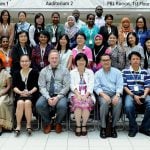IMU BSc (Hons) in Pharmaceutical Chemistry is a three-year programme. It is an interdisciplinary programme which prepares students with knowledge and skills associated with pharmaceuticals including drugs development as well as other chemistry-related activities. In Semester 6, students will undergo a 4-month internship which is essential in this programme.
Herbal Medicine Research Centre (HMRC) was established in 2001 to provide scientific evidence for herbal products safety and efficacy. The research centre is under the Institute for Medical Research (IMR) at the Malaysian National Institute of Health (NIH) and coordinates its research activities with four units: Bioassay Unit, Information Unit, Phytochemistry Unit and Toxicology & Pharmacology Unit.
A group of six IMU Pharmaceutical Chemistry students from PC219 cohort were placed under the Phytochemistry Unit of HMRC, located at Setia Alam, Selangor for internship from November 2022 to March 2023 and supervised by a few researchers. The function of the Phytochemistry Unit mainly comprises of developing standardised extract for bioactivity/toxicity evaluation, as well as natural products drug discovery. The unit is also involved in investigations involving chemical profiling and characterisation of medicinal plant and fungal extracts for a variety of secondary metabolites and carbohydrate compounds, as well as the development of standardised formulations through innovative approaches and methodologies. Students were tasked to conduct phytochemical analysis on a specific plant or fungi that was assigned to them, and had to present their research findings to a panel of judges from IMU and IMR at the end of their internship.

Chen Yi Lin
As a Pharmaceutical Chemistry student, most would probably assume that I have a passion for drug discovery and development so that I can make the world a better place. However, disappointingly the initial reason I chose to take this course was not so commendable. For the longest time, I’ve had an interest in cosmetic or personal care product formulation and hence, I chose Pharmaceutical Chemistry programme because I felt it would give me a strong chemistry background and equip me with the proper lab skills so that I am able to branch into the cosmetic industry and potentially formulate my own products in the future.
After conducting experiments during my secondary school and A-level studies, I realised that I am the type of person who can sit quietly in a laboratory and complete my task. I am passionate about drug research and enjoy laboratory work. Then I was introduced to the Pharmaceutical Chemistry programme at IMU. In terms of preparing me for my internship, I would say that during my time at IMU, I learned a wealth of chemistry knowledge and have enhanced my laboratory skills.

Chia Xiao Jun
Yeoh Pei Yi (in the photo above)
I was looking forward to starting my degree after completing the foundation programme as I am passionate in drugs design since high school. As a result, I had a fascinating beginning to my three years of undergraduate studies which started with me eagerly checking on the course structure of Pharmaceutical Chemistry. While undergoing this programme which is only offered in IMU, I realised this programme had introduced me into various aspects of pharmaceutical and chemical industry which allowed myself to be attached in different industries. Besides, this programme had prepared me to be well equipped with contemporary expertise and competences which are essential for a rewarding profession in different fields. As Covid-19 has emerged globally, this scenario had fortified my interest in drugs design to a higher level to discover new drugs which have high therapeutic properties with minimal side effects.
Chemistry used to be one of my favourite subjects during high school life as I feel fascinated when looking at the effects of various elements reacting together and observed with colour changes. I am also keen to explore the ingredients and mechanisms of matters surrounding me. My passion towards chemistry has not diminished even after graduating from high school and hence, I joined the IMU Foundation in Science programme. Looking back over the years, it is safe to say that enrolling myself in IMU is absolutely the right decision. Throughout the foundation year, IMU had organised numerous events including briefing sessions, workshops, and industrial visits for foundation students to gain more understanding of undergraduate courses, which had made a great impact in me to discover my future pathway. The fun exposure to hands-on activities such as the formulation of cosmetic products as well as the industrial visits to a cosmetic industry located in Puchong was the start of my journey in the BSc (Hons) in Pharmaceutical Chemistry.

Jocelyn Ng Kai Xin
The Internship
Chen Yi Lin
When we were first told to start applying for internships, all the companies I approached were involved in the personal care industry. However, I did not get many positive responses, potentially due to the ongoing pandemic and hence, not many companies were willing to accept interns into their lab. Therefore, when I applied to HMRC, it was honestly as a backup plan and not because I was particularly interested in herbal medicine research. However, I guess fate has a weird way of messing with you, because after my internship experience here at HMRC, I can truly say that it has been an invaluable and precious experience that has taught me so much more than I could’ve ever asked for.
During my internship, I was under the supervision of Dr Maizatul Hasyima Omar, she is the Head of the Phytochemistry Unit in HMRC. The four-month internship experience was truly like conducting a research project semi-independently. While conducting the phytochemical analysis of my plant- Garcinia Mangostana (a.k.a. mangosteen), I was able to apply previously learnt knowledge from lectures for example application principles and procedures of various analytical instruments such as HPTLC, HPLC, FTIR, LCMS and validation procedures.
The research officers and laboratory assistants at HMRC were all very willing to guide us whenever we encountered any experimental issues as well. However, they did not constantly hover over our backs; hence, this independence encouraged us to do further research on our own. I am very grateful to have had the hands-on experience during my time at HMRC, as it allowed me to deepen my understanding of various analytical techniques and gave me insight on their importance as well.
Chia Xiao Jun
I knew very little about phytochemistry before my internship at HMRC’s phytochemical unit. I knew I wanted to learn more from my supervisor, Dr Maizatul Hasyima Omar, after she gave me an overview of phytochemistry. They created our training schedule. Our daily and weekly tasks are detailed in the schedule. I was concerned that I would not be able to complete all of my responsibilities in four months. Fortunately, I was able to.
I gained more knowledge than I expected during my internship at the HMRC’s phytochemistry unit. I was assigned a short project to identify the chemical marker in “ubi gadong” – a carbohydrate plant that has potential medicinal effect, and also in charge of the Fourier transform infrared spectroscopy (FTIR) – an analytical instrument that able to identify the chemical components of a sample. My involvement in this project and taking charge of FTIR enabled me to extend my knowledge and develop new skills. I initially learned how to extract “ubi gadong” using a variety of solvents and then how to remove excess solvents from the extract using a variety of equipment. After obtaining sample extracts, I began analysing and performing FTIR. I’ve learned to manage my time effectively in order to complete all tasks on time. During analysis, I have enhanced my skills in dealing with other analytical instruments including high performance thin layer chromatography (HPTLC), liquid chromatography mass spectrometry (LCMS), and ultra-performance liquid chromatography (UPLC). I am grateful to be enrolled into the Pharmaceutical Chemistry programme as the knowledge and skills acquired prior to my internship has helped in my internship, particularly when it came to using equipment.
Throughout my internship, I encountered several challenges. For instance, I was not always able to obtain a good spectrum when performing FTIR. To overcome the challenges, I explored different resources to search for solutions facing in FTIR analysis. Thankfully, I was able to handle each of these concerns in FTIR.
The second problem occurred during HPTLC. My chromatography plates had poor separation, which resulted in several spots went undetected. Despite her busy schedule, my supervisor, Dr Maizatul, was willing to meet with me and discuss my concerns, guiding me to obtain a better result.
Yeoh Pei Yi
As part of the Pharmaceutical Chemistry programme, I spent four months as an intern at Herbal Medicine Research Centre (HMRC) working with the incredible research team. Specifically, I was interning at the Phytochemistry Unit department and placed under a project with title ‘Phytochemical Analysis and Identification of Cyanidin-3-O-sambubioside and Delphinidin-3-O-sambubioside in Hibiscus sabdariffa L. (Roselle)’.
During the internship, I was exposed to different aspects in my field of study. It allowed me to recognise the areas that I excelled at and those I needed to develop more. Significantly, I was able to try out new analytical instruments, learn new skills along the way and leverage my mistakes to motivate me to improve further. For instance, I had the opportunity to use Fourier Transform Infrared Spectroscopy (FTIR), High Performance Thin Layer Chromatography (HPTLC), Ultra Performance Liquid Chromatography (UPLC), and Liquid Chromatography Mass Spectrometry (LCMS). All these instruments were used for the analysis of the natural herbal products, Hibiscus sabdariffa L. Besides, I also did phytochemical analysis for other natural products such as Garcinia mangostana (mangosteen), Dioscorea hispida (ubi gadong), Schizophyllum commune (split gill fungus) and Eurycoma longifolia (Tongkat Ali).
I must say that the knowledge learnt from Pharmaceutical Chemistry programme has allowed me to adapt to this research-based internship attachment easier. The principles as well as hands-on experiences in practical sessions of some of the modules such as General Chemistry and Pharmaceutical Analysis I, II, III are very relevant to the application of the abovementioned analytical instruments and data analysis.
While I gained a variety of laboratory experiences and skills, I believed that having the opportunity to learn from a seasoned professional like Dr Maizatul Hasyima Omar has inspired me on a daily basis and guided me to work toward achieving the goals set. Her work ethic and professionalism had motivated me to strive for continuous improvement and beyond what was required.
Jocelyn Ng Kai Xin
Due to the pandemic, my university life is mostly online learning, but I appreciated IMU and the Pharmaceutical Chemistry programme particularly as they have given flexibility in our learning schedule and continue to focus on students’ technical skills by rearranging the on-site laboratory practical sessions. Both theories and hands-on skills acquired from lectures and practical classes, respectively have helped me to adapt to the internship quickly.
The internship experience at the phytochemistry unit proved me to be more fruitful than I had anticipated as I gained numerous invaluable knowledge from the research officers who are the experts in this field and most importantly, having hands-on experience in quality control of herbal products from the raw material collection, extraction, qualitative and quantitative analysis via various instruments were exciting experiences. Although the instruments are costly and need to be handled cautiously, I am grateful to HMRC which allowed interns to handle these scientific instruments closely as this opportunity is certainly beneficial to my future profession.
Besides, I was also exposed to new computer software and handling of database which is used to predict the molecular formula and its fragmentation structure of a chemical compound. This is important in identifying a new chemical compound.
Other than acquiring technical skills, I have shown improvement in my soft skills, particularly communication skills when conveying my opinions in discussion with my supervisor and other colleagues. This has developed my conceptual skill and think critically towards the drawbacks of the findings.
Mini Project Presentation
Chen Yi Lin
At the end of our internship, we were all tasked to create a research poster and speak in a mini research project presentation contest. We were only given less than two weeks to prepare for this challenge, and I can say it was definitely one of the most stressful weeks of my life. One of the reasons for this is that I had not presented to a live audience in a very long time, as the pandemic had forced us to conduct all our previous presentations online. However, without this challenge, I don’t think I would have understood my research as well as I do now; it made me question every result I got, which led me to investigate on all the “why” and “how”, so that I could explain my results clearly to the audience. Not to mention, I was able to develop my public speaking skills through this experience too. However, I do believe there is still much more for me to learn, as my research was not as complete as I would’ve liked it to be, due to the lack of time. Hence, one regret of mine was not managing my time as well as I should’ve during my internship.
Yeoh Pei Yi
At the end of internship, I was told to design a poster and give an oral presentation to present my findings and results based on the project assigned by my supervisor, as well as other researchers in HMRC and other departments. I had stage fright at the beginning, however I got less frightened and was more relieved after I think back to the usual presentations that we have done back in IMU. I am glad that I was able to present my research project findings smoothly and confidently at last.
Jocelyn Ng Kai Xin
I have participated in a mini seminar to showcase my findings to the public and researchers from various departments of IMR in the last week of my internship. At first, it was challenging for me to give an oral presentation in front of audiences as I am used to giving virtual presentation over these two years due to the COVID-19 pandemic. However, with the encouragement among all of us, the interns at HMRC, at last I have delivered my presentation confidently.




After the Internship
Chen Yi Lin
Through this internship experience, I learnt a lot about what it takes to be a true researcher and also had a glimpse into the world of drug discovery. Before entering HMRC, I was only interested in cosmetic or personal care formulation; however, now I realise that phytochemical research is a field I may potentially be interested to learn more about as well.
Hence, one advice I would give to my juniors who are preparing for their internship is to keep an open mind. Enter your internship with a heart that’s willing to learn and do your best at whatever task you are given, even if you don’t like it, because you never know what you may be able to learn from the people you meet outside the shelter of your university.
To end, I truly am immensely grateful to have been able to complete my internship at HMRC; it was a great blessing and if I were to have another chance, I would love to go back and continue learning more from them.
Chia Xiao Jun
Although I have less interest in herbal medicine before joining HMRC, I am pleased to complete my internship at the phytochemistry unit successfully. From this internship, I gained extra knowledge, essential life skills, and enhanced my technical knowledge from what I learned at IMU. I grew more interest in herbal medicine after joining HMRC. The internship has driven me to reconsider my field of interest and make me more determined to work diligently regardless of whichever field I will join eventually to enhance my laboratory skills.
Yeoh Pei Yi
As a personal gratitude, I am more than grateful to Prof Mallikarjuna Rao Pichika, Dr Lee Choy Sin, Dr Keng Pei Sin and Mak Kit-Kay for their continuous support and communications with my external supervisor Dr Maizatul Hasyima Omar in making this internship possible and memorable. Not forgetting my fellow friends who were also interns at HMRC, I was lucky to have a bunch of great people supporting me throughout the internship.
As for my future plans, I will keep exploring other research centres, in private or government sector which is assisting in drug designs and development to continue my passion in research and development.
Jocelyn Ng Kai Xin
Failure, of course, is a common part of scientific research. However, I was inspired by my supervisor, June Lee Chelyn of her professionalism and the spirit of never giving up. I learned problem-solving and data interpreting skills from her when there were inconsistencies of the results obtained. We had tried various methods for about a month to ensure the data collected is accurate. As an intern, I realised how important ethical practice and integrity in research is essential in building up trustworthiness between the public and researchers.
To my juniors, my advice is to grab all learning opportunities as much as possible and practice note-taking of key points in each learning, which will be useful in your future career.
In short, I appreciated the internship opportunity at the phytochemistry unit. On top of developing my research and soft skills throughout the internship, it also allowed me to understand a research organisation better, and the contribution of a group of researchers to the society. The experiences gained at HMRC had also led me to recognise my personal strengths and weaknesses. I will continue to learn and improve to be more work ready.









